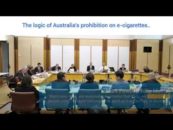It is commonly said that virtue signalling, or using opinions to display your moral superiority, is a characteristic of the progressive side of politics. Rather than address important problems like endemic domestic violence in Indigenous communities, for example, virtue signallers take far easier options such as wearing white ribbons and berating business for its lack of gender balance.
But the death of sports journalist Rebecca Wilson has shown me that virtue signalling is found on all sides. In life she was a confrontational journalist with little regard for her impact on the people she wrote about. But in death we must say only nice things lest we be found lacking decency ourselves.
In 2015 the Senate inquiry into the nanny state, which I chaired, examined the heavy handed treatment of fans of the Western Sydney Wanderers football club, in particular its fan group the Red and Black Bloc (RBB), by the NSW Police. While a few individuals had engaged in antisocial behaviour, it was obvious the entire fan group was being targeted. In evidence to a hearing in Sydney, a police witness justified this by pointing to the lewd chants of the fans.
Soon after the hearing, Wilson wrote an article for the Sunday Telegraph in which she named 198 football fans who, she said, had been banned by the Football Federation (FFA) from attending matches due to thuggish behaviour. A third of them were Wanderers fans.
There was a problem with her list. Not all those on it had actually been banned, some didn’t know they were banned, some had been banned on spurious grounds, and some were under 18 and should not have been named irrespective.
Wilson then did TV interviews in which she inferred Wanderers fans were, by and large, criminals and terrorists. Especially the RBB. The fact that some had names such as Fadi or Mohammed seemed to be a factor. She admitted, months later, that she knew little about football and had never been to a Wanderers game prior to writing the article.
Wanderers fans were outraged. They demanded the FFA allow due process before imposing bans. When the FFA demurred, they united with fans of other clubs to boycott games, leaving stands empty. The FFA caved.
Wilson never acknowledged the damage to young lives caused by her accusations, or revealed how she obtained the information allowing her to abuse their privacy. She continued to insist there were criminals amongst the fans, while ignoring similar behaviour among NRL fans. Their use of flares, in her view, was sufficient to condemn them all.
Following her story I argued in support of the fans and against collective guilt. When her death was announced in the media, I tweeted “Doubt there’ll be many #WSW fans at Rebecca Wilson’s funeral. #innocentlivesdamaged”, with a link to an article about her story.
It was a simple statement of opinion, but nonetheless set off an orgy of outrage and virtue signalling. Responses ranged from hostile to overtly threatening. There were threats of violence, abundant Anglo-Saxon pejoratives and massive hyperbole, such as the Courier Mail’s National Affairs Editor, Dennis Atkins, tweeting it was the “Most appalling thing I’ve seen in almost 40 years writing about politics”.
Really? More appalling than the Srebrenica massacre or sexual enslavement of the Yazidis?
And almost no-one considered whether and why WSW fans would not be attending Wilson’s funeral.
In fact, blog sites confirm the work of Wilson was widely disliked in sports circles, and not just among football fans. But for WSW fans it went further; at the game against Sydney FC immediately after her death, a flare was lit at the 54th minute in her “honour”. Wilson was 54 when she died.
It is natural that Wilson would be mourned by her family, friends and journalistic colleagues. Dying of breast cancer at a relatively young age is a tragedy, no matter who it affects.
But none of that justifies or excuses those who knew her, or those who just wanted to signal their moral superiority, from becoming a virtual lynch mob in response to daring to suggest she was less than perfect. Decency does not demands amnesia and The Chaser’s Eulogy song, “Even arseholes are top blokes after death” remains satire, not holy writ.
As far as I know there were no WSW fans present at Wilson’s funeral.
David Leyonhjelm is a Senator for the Liberal Democrats









